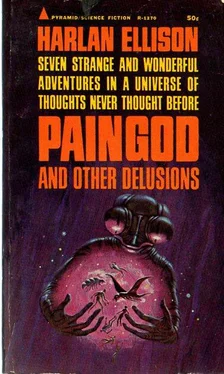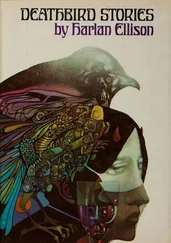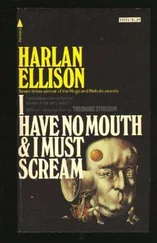More than that you can’t expect.
After all, Golding doesn’t introduce his books. Bellow doesn’t introduce his books. Ike Asimov has proved his virility enough for all us science fiction writers. And Ayn Rand is better at karate than all of us. So forgive the omission this time. I’ll catch you next time around.
You wouldn’t have liked an introduction, anyway.
I tend to pomposity in them.
Harlan Ellison
Hollywood, 1965
Late in March of 1965, I was compelled to join twenty-five thousand others, from all corners of the United States, who marched on the then-bastion of bigotry, the then-capitol of corruption, Montgomery, Alabama (though South Boston now holds undisputed title to the designation, Montgomery is still no flowerbed of racial sanity) (but the myth of the “liberal” North sure got the hell shot out of it by the Southies from Irish-redneck Boston).
I was part of the human floodtide they called a “freedom march” that was trying to tell Governor George Wallace that Alabama was not an island, that it was part of the civilized universe, that though we came from New York and California and Illinois and South Dakota we were not “outside agitators,” we were fellow human beings who shared the same granfalloon called “Americans,” and we were seeking dignity and civil rights for a people shamefully bludgeoned and mistreated for over two centuries. It was a walk through the country of the blind. I’ve written about it at length elsewhere.
But now it’s ten years later and yesterday a friend of mine’s sixty-five-year-old mother got mugged and robbed in broad daylight by two black girls. It’s ten years later and a girl I once loved very deeply got raped repeatedly, at knife-point, in the back seat of her own car in an empty lot behind a bowling alley in the San Fernando Valley by a black dude who kept at her for seven hours. It’s ten years later and Martin Luther King is dead and Super Fly is alive, and what am I to say to Doris Pitkin Buck, who lost her dear and magical Richard on the streets of Washington, D.C., to a pack of black killers who chose to stomp to death a man in his eighties for however much stash-money he might have been carrying?
Do I say to that friend of mine: when they went to drag the Mississippi swamps for the bodies of the civil rights workers Chaney, Schwerner, and Goodman, they dredged up the bodies of sixteen black men who had been cavalierly murdered and dumped in the muck, and no one even gave a damn, the newspapers didn’t even make much of a note of it, that it was the accepted way to handle an “uppity nigger” in the South? Do I say that and hope I’ve said something rational?
Do I say to that girl I loved: every time you see a mocha-colored maid or waitress it means her great-great-grandmother was a sexual pin cushion for some plantation Massa’, that rape and indentured bed service was taken for granted for two hundred years and if it was refused there was always a stout length of cordwood to change the girl’s thinking? Do I say that and hope I’ve drawn a reasonable parallel?
Do I tell brave and talented Doris Buck, who never hurt anyone in her life, that we’re paying dues for what our ancestors did, that we’re reaping the terrible crop of pain and evil and murder committed in the name of White Supremacy, that white men rob and rape and steal and kill as well as black, but that blacks are poorer, more desperate, more frustrated, angrier? Do I say that and hope to stop her tears with logic?
Why the hell do we expect a nobility of blacks that whites never possessed?
Of course I don’t say that pack of simple-minded platitudes. Personal pain is incapable of spontaneous remission in the presence of loss. I say nothing.
But my days of White Liberal Guilt are gone. My days of championing whole classes and sexes and pigmentations of people are gone. The Sixties are gone, and we live in the terrible present, where death and guilt don’t mix. Now I come, after all these years, to the only position that works: each one on his or her own merits, black/white/yellow/brown. Not all Jews are money-gouging kikes, but some are. Not all blacks are slavering rapists, but some are. Not all Puerto Ricans are midnight second-storey spicks, but some are.
And we come to the question again and again, what kind of a god is it that permits such misery … are we truly cast in his image, such an image of cruelty and rapaciousness … were we put here really to suffer such torment? Let the Children of God answer that one with something other than no-brain jingoism. Mark Twain said, “If one truly believes there is an all-powerful Deity, and one looks around at the condition of the universe, one is led inescapably to the conclusion that God is a malign thug.” That’s the quote that caused me to write “The Deathbird.” It’s a puzzle I cannot reason out.
I doubt. I have always doubted, since the day I read in the Old Testament — the word of God, remember — that there was only Adam and Eve and Cain and Abel, and then Cain got married. To whom? To Eve? Then don’t tell me what a no-no incest is.
Isaac Asimov assures me it’s a rational universe, predicated on sanity and order. Yeah? Well, tell me about God. Tell me who He is, why He allows the foulest hyenas of our society to run amuck while decent men and women cower in terror behind Fox locks and Dictograph systems. Tell me about Him. Equate theology with the world in which we live, with William Calley and Kitty Genovese and the people who keep their kids out of school because the new textbooks dare to say Humans are clever descendants of the Ape. No? Having some trouble? Getting ready to write me a letter denouncing me as the Antichrist? “God in his infinite wisdom,” you say? Faith, you urge me? I have faith … in people, not Gods.
But perhaps belief is not enough. Perhaps doubt serves the cause more honestly, more boldly. If so, I offer by way of faith Paingod.
TEARS WERE IMPOSSIBLE, yet tears were his heritage. Sorrow was beyond him, yet sorrow was his birthright. Anguish was denied him; even so, anguish was his stock in trade. For Trente, there was no unhappiness; nor was there joy, concern, discomfort, age, time, feeling.
And this was as the Ethos had planned it.
For Trente had been appointed by the Ethos — the race of somewhere/somewhen beings who morally and ethically ruled the universes — as their Paingod. To Trente, who knew neither the tug of time nor the crippling demands of the emotions, fell the forever task of dispensing pain and sorrow to the myriad multitudes of creatures that inhabited the universes. Whether sentient or barely capable of the feeblest unicellular reaction-formation, Trente passed along from his faceted cubicle invisible against the backdrop of the changing stars, unhappiness and misery in proportions too complexly arrived at to be verbalized.
He was Paingod for the universes, the one who dealt out the tears and the anguish and the soul-wrenching terrors that blighted life from its first moment to its last. Beyond age, beyond death, beyond feeling — lonely and alone in his cubicle — Trente went about his business without concern or pause.
Trente was not the first Paingod, there had been others. They had come before, not too many of them, but a few, and why they no longer held their post was a question Trente had never asked. He was the chosen one from a race that lived almost indefinitely, and his job was to pass along the calibrated and measured dollops of melancholy as prescribed by the Ethos. It involved no feeling and no concern, only attention to duty. It was his position, and it was his obligation. How peculiar it was that he felt concern, after all this time.
Читать дальше












